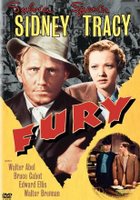
Few films have ever been more appropriately titled. His first film made in America after fleeing both the Nazi party and his homeland of Germany, Fritz Lang's
Fury is an engrossing dissertation on the barbarous impulses that drive human nature and the need to restrain them in order to live in a decent and civilized society. Part commentary on civic laziness in America, part look at the flaws of a legal system that holds the power to sentence people to death, and part reflection on the horrors of fascism, the film magnifies it's small love story to monolithic proportions in the midst of the hard times of the depression. Separated by financial burdens for over a year, Joe Wilson is driving from Chicago into the country to reunite with his fiancé Katherine Grant (Sylvia Sidney) when he's inexplicably arrested for the recent kidnapping of a local girl. With only minor circumstantial evidence to hold against Joe, the sheriff continues through the proper legal processes, knowing that he is just as likely to be innocent as guilty. The townsfolk, on the other hand, take hold of the news and twist the facts until his guilt is certain beyond any doubt; justice must be had, and it may as well be the first man arrested. Lang's multi-layered film uses its violent spectacle to the same effect as Spike Lee's
Do the Right Thing; the viewer acts as a horrified witness to the inhumanity at hand, unable to alter the events unfolding. Through a series of unexpected events, the film reverses the roles of the criminals and the victims in a tense, illuminating legal battle that highlights, among other things, the futility of revenge and the fallibility of human judgment.
Fury is a slap in the face to anyone who thinks that the life of any citizen should be entrusted to a legal system so easily subjected to the whims of irrational, bloodthirsty recklessness.




 Few films have ever been more appropriately titled. His first film made in America after fleeing both the Nazi party and his homeland of Germany, Fritz Lang's Fury is an engrossing dissertation on the barbarous impulses that drive human nature and the need to restrain them in order to live in a decent and civilized society. Part commentary on civic laziness in America, part look at the flaws of a legal system that holds the power to sentence people to death, and part reflection on the horrors of fascism, the film magnifies it's small love story to monolithic proportions in the midst of the hard times of the depression. Separated by financial burdens for over a year, Joe Wilson is driving from Chicago into the country to reunite with his fiancé Katherine Grant (Sylvia Sidney) when he's inexplicably arrested for the recent kidnapping of a local girl. With only minor circumstantial evidence to hold against Joe, the sheriff continues through the proper legal processes, knowing that he is just as likely to be innocent as guilty. The townsfolk, on the other hand, take hold of the news and twist the facts until his guilt is certain beyond any doubt; justice must be had, and it may as well be the first man arrested. Lang's multi-layered film uses its violent spectacle to the same effect as Spike Lee's Do the Right Thing; the viewer acts as a horrified witness to the inhumanity at hand, unable to alter the events unfolding. Through a series of unexpected events, the film reverses the roles of the criminals and the victims in a tense, illuminating legal battle that highlights, among other things, the futility of revenge and the fallibility of human judgment. Fury is a slap in the face to anyone who thinks that the life of any citizen should be entrusted to a legal system so easily subjected to the whims of irrational, bloodthirsty recklessness.
Few films have ever been more appropriately titled. His first film made in America after fleeing both the Nazi party and his homeland of Germany, Fritz Lang's Fury is an engrossing dissertation on the barbarous impulses that drive human nature and the need to restrain them in order to live in a decent and civilized society. Part commentary on civic laziness in America, part look at the flaws of a legal system that holds the power to sentence people to death, and part reflection on the horrors of fascism, the film magnifies it's small love story to monolithic proportions in the midst of the hard times of the depression. Separated by financial burdens for over a year, Joe Wilson is driving from Chicago into the country to reunite with his fiancé Katherine Grant (Sylvia Sidney) when he's inexplicably arrested for the recent kidnapping of a local girl. With only minor circumstantial evidence to hold against Joe, the sheriff continues through the proper legal processes, knowing that he is just as likely to be innocent as guilty. The townsfolk, on the other hand, take hold of the news and twist the facts until his guilt is certain beyond any doubt; justice must be had, and it may as well be the first man arrested. Lang's multi-layered film uses its violent spectacle to the same effect as Spike Lee's Do the Right Thing; the viewer acts as a horrified witness to the inhumanity at hand, unable to alter the events unfolding. Through a series of unexpected events, the film reverses the roles of the criminals and the victims in a tense, illuminating legal battle that highlights, among other things, the futility of revenge and the fallibility of human judgment. Fury is a slap in the face to anyone who thinks that the life of any citizen should be entrusted to a legal system so easily subjected to the whims of irrational, bloodthirsty recklessness.




